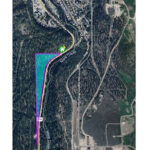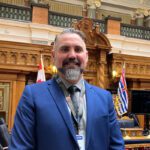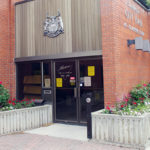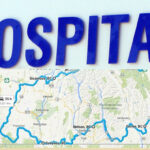Home »
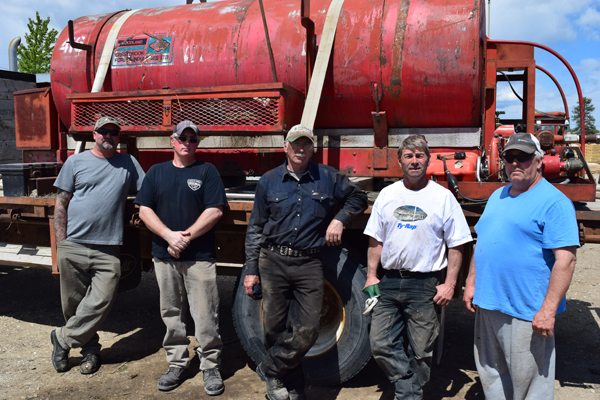
Local heroes contained Wasa fire
By Nowell Berg
On the morning of May 5, two homes on Aspen Road at Wasa were completely destroyed by fire. Nothing remained but charred metal, tin roofs, burnt out vehicles and a stone chimney.
If not for the quick reaction of Larry Gould, owner of Mardis Forest Products, to dispatch the mills fire crew and water pump truck the damage would have been far greater. Gould gives all the credit to the fire crew which is made up of Tyson Clive, Sandy Campbell, Harvey Johnson and Glenn Cottle.
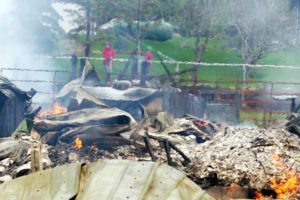 When Clive and Campbell arrived shortly after 7 a.m. with the pumper truck, the two homes were completely engulfed in flames. “We worked to contain the fire and stop it from spreading,” said Clive. Johnson and Cottle had arrived minutes earlier with Gould.
When Clive and Campbell arrived shortly after 7 a.m. with the pumper truck, the two homes were completely engulfed in flames. “We worked to contain the fire and stop it from spreading,” said Clive. Johnson and Cottle had arrived minutes earlier with Gould.
The fire crew was able to hose down a third home in time to prevent it from bursting into flames. The west wall of that home was charred and smoking. It wouldn’t have been long before it caught fire. Later, Gould said he looked inside the garage and saw that “all of the tools hanging on the wall were melted.”
At one point, the fire crew put a pump in the lake and strung a two inch hose 800 feet all the way to the fire site. Johnson stayed all night hosing down hot spots and making sure the fire did not flare up again. A major disaster was averted due to the hard work of the Mardis fire crew.
The action of these local heroes and neighbours helped prevent the fire from spreading to the other twelve homes in the NE area of the lake between Aspen Road and Wasa Lake Park Drive.
Commander of the Kimberley RCMP Detachment, Sgt. Chris Newel, reports the fire is “not deemed suspicious.” He also said the fire’s cause is unknown and not likely to be determined because there is “no evidence left behind after a fire burns itself out.”
In the past, Regional District of East Kootenay (RDEK) Electoral Area E Director, Jane Walter, has tried to get the RDEK to install a volunteer fire department at Wasa. The last time she went to Wasa residents asking for volunteers there were not enough people willing to be firefighters.
Travis Abbey, RDEK Emergency Services Coordinator, said the issue of fire protection in rural areas like Wasa is complex and costly. “The biggest challenge in a smaller rural area like [Wasa] is the volunteer base. No matter what kind of money you throw at a fire department you still need a solid volunteer base to manage that program,” he said. Even if there are enough people who would participate as volunteer firefighters, the cost for equipment, a building and training would greatly exceed $500,000 which directly impacts the level of taxes. “It’s a double edge sword with the the cost piece and the volunteer piece,” said Abbey.
“Its a tricky one for us because we [RDEK] don’t staff a full-time wildfire expert and we’d probably struggle with rural tax payers to staff a full-time position,” added Abbey. He went on to say, “If there’s anything that costs additional money from private property owners that’s the first stumbling block.”
Abbey recommends private property owners familiarize themselves with the Fire Smart plan which will help “mitigate risk” of fire damage to homes. If a home owner plans on replacing the roof, then use tin or asphalt shingles not cedar shakes. Keep the vegetation cleared and controlled a full 10 metres (30 feet) around the home which “does an enormous amount to reduce fire risk.”
Information on Fire Smart can be found on the BC Wild Fire website.
For Wasa residents with large Ponderosa pine trees the best thing is to prune them at least 3 meters up from the ground. This will reduce the opportunity for fire to climb into the tree crowns. If you are planting trees, Abbey recommends deciduous leaf bearing trees because they hold more water and do not catch fire as easy as pine trees.
Abbey said that if Wasa residents are serious about a fire department they should bring a request to Area E Director Jane Walter. She would then take the communities request to the RDEK Emergency Planning Department. Once that happens, then “We’ll look at it and try to come up with some rationale to make it work,” he said. If the Wasa community wants to pay more in taxes and has the volunteers, then a local fire department could potentially happen.
However, with the small number of permanent residents living at Wasa its highly probable a volunteer fire department won’t happen. In the end, its up to property owners to be prepared as best they can for the eventuality of fire.
Above image: Mardis Fire Crew: Tyson Clive (L), Sandy Campbell, Harvey Johnson, Larry Gould and Glenn Cottle. Photo by Nowell Berg

